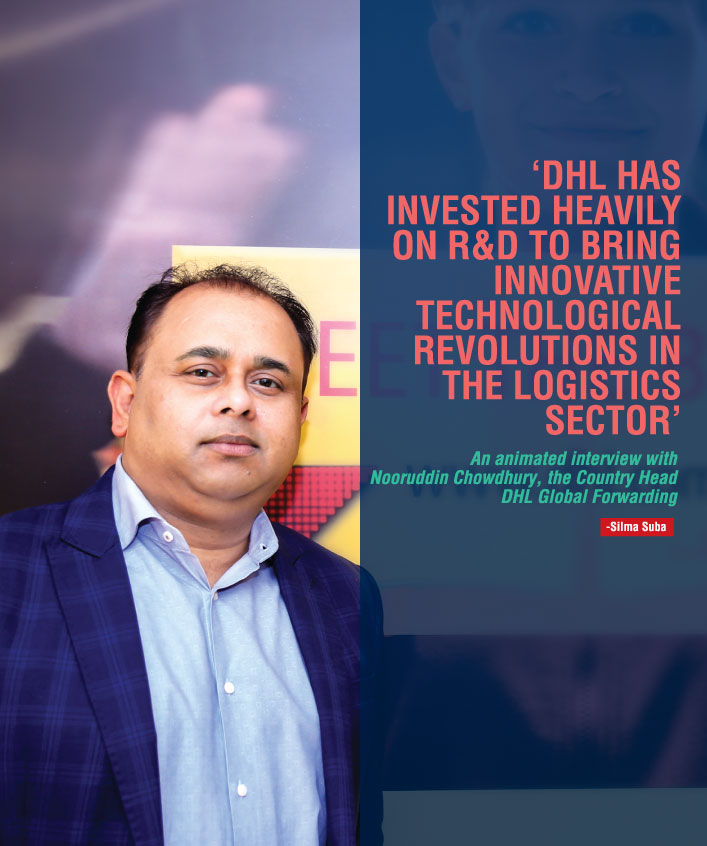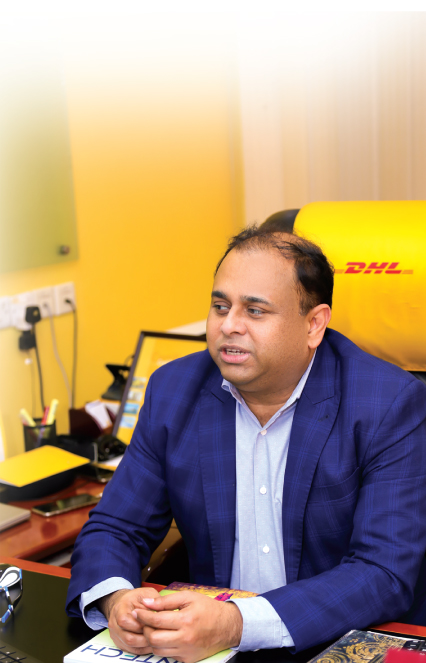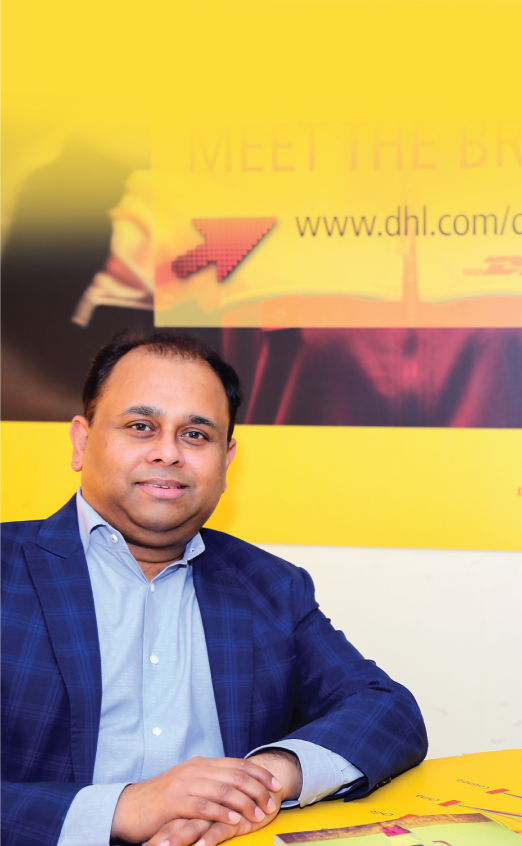
Nooruddin Chowdhury is a veteran in logistics and supply chain industry. He graduated from Chittagong University in 1987, where he had majored in finance, from the department of accounting.
Nooruddin started his career as a management trainee at Neptune Orient Lines (NOL) in Dhaka, a global company with core business in container shipping, and worked there for seven years and grew from branch manager to assistant general manager there.
In 2006, he joined as Chief Operating Officer for SG Logistics PVt. Ltd., a partner of the global logistics leader DB Schenker network, and stayed there until 2011. In 2011, he was appointed as the Country Head of DHL Global Forwarding Ltd
Nooruddin Chowdhury has the customary conviviality of a ‘Chatgaia’ person. The Fintech team got a taste of his jovial nature and hospitality when it met him in his seemingly old yet cozy office near Banani market mosque.
A veteran of the logistics and shipping industry with over 25-years of experience, Nooruddin knows the ins and outs of the industry like the palms of his hands. He is currently leading DHL Global Forwarding in Bangladesh as its country manager.
With his baritone voice, he discussed the significant role he and DHL has played in enhancing the logistic capabilities in the country, which is one of the fastest-growing nations in South Asia.
FINTECH: How did you become a part of the DHL Global Forwarding narrative in Bangladesh?
N. Chowdhury: I graduated from Chittagong University in 1987, where I had majored in finance, from the department of accounting. I started my career as a management trainee at Neptune Orient Lines (NOL) in Dhaka, a global company with core business in container shipping, and I worked there for 7 years, growing from branch manager to assistant general manager. That’s where I began building my expertise in logistics and supply chain management. In 2006, I joined as Chief Operating Officer at SG Logistics PVt. Ltd., a partner of the global logistics leader DB Schenker network, and stayed there until 2011, when I was appointed as the country head for DHL Global Forwarding in Bangladesh and I’ve been a part of it ever since.
FINTECH: Can you shed some light on the history of DHL?
N. Chowdhury: There are multiple companies and activities carried out under the DHL brand name, but the birth of DHL Global Forwarding was in 1815, though back then it was known as Danzas. It was started by Loius Danzas, who had fought at Waterloo for Napoleon, where he lost. For the most part, Danzas blamed the lack of proper logistics and supply chain as the main reason for their loss, as the other side had more ships, more people and more expertise. That’s why, after the war, he joined a transport company owned by Michel l’Eveque and by 1840 became joint owner. It grew as an MNC in the 60s and in 2005 it came to be known as DHL Global Forwarding.
As the world’s leading logistics company, we manage freight forwarding through air freight and sea freight, carry out various contract logistics and warehouse operations, provide inventory management and distribution services, manage reverse logistics, returns, and replacements for customers across various sectors. In fact, we did replacements for one of the largest telecom companies in Bangladesh; it’s like, you know those batteries on your phone that run out? They are stored in our warehouses, and when you order a replacement, the highest chances are that they come from us.
FINTECH: What is your assessment of the future of the logistics industry in Bangladesh? What is its current ranking in the World Bank Logistics Performance Index?
N. Chowdhury: The logistics industry in Bangladesh has great potential going forward. The Bangladesh economy has consistently maintained high rates of growth over the last decade. The World Bank predicts that the country’s GDP would grow by 6.8% in 2017. The steady growth and current political stability has made the economy a fertile ground for the expansion of the logistics industry. However, the expansion can be made only if the connectivity and infrastructure are developed further.
Bangladesh’s logistics performance has improved according to World Bank’s biennial Logistics Performance Index published last year 4, 5. Bangladesh has jumped 21 positions to 87 in 2016 from 108 two years earlier, while the overall score has improved to 2.66 from 2.56 on a scale of 5. The improvement is noticeable and encouraging, but there still is some way to go in terms of infrastructure, connectivity and expertise. With talk of several ambitious infrastructure and connectivity projects in the country, it is a commendable step forward.
 FINTECH: In the last few years the logistics and the freight forwarding market in Bangladesh has seen the entrance of a number of new players. Is the market become more competitive and is it making the service of the logistics company better?
FINTECH: In the last few years the logistics and the freight forwarding market in Bangladesh has seen the entrance of a number of new players. Is the market become more competitive and is it making the service of the logistics company better?
N. Chowdhury: As a matter of fact, the logistics industry in Bangladesh has not seen many new major entrants over the last few years. While many international organizations are interested to invest in the growing Bangladesh market, I believe more global players will come when issues like restrictions on equity are resolved, leading to healthy competition for the industry.
 FINTECH: What is your view on the rate of growth in exports from Bangladesh over the years?
FINTECH: What is your view on the rate of growth in exports from Bangladesh over the years?
N. Chowdhury: As you have surely noticed, Bangladesh’s economy has been growing exponentially, with an increasing GDP rate of 7.1%, and it has been very steady. I believe that in the next 5 years or so, we will witness further growth in the exports industry for various sector goods.
The corporate tax for apparels has recently been cut significantly in the national budget, which should help exporters in terms of international competitiveness. How it eventually turns out, however, remains to be seen.
We have huge potential to grow in the pharmaceuticals industry, our leather industry which is quite old but has a lot of opportunity to export to European countries, where leather is high in demand.
Our furniture industry, honestly, not just wooden ones, but those made out of biological products, have a good future ahead, and in fact places like Haatil have already established stores in Canada. I firmly believe that we can compete neck-to-neck and even advance beyond competitors like China and Vietnam.
At the same time, we also need to keep going strong with the industries that we are already leading in exports, like the garments industry – especially for t-shirts and denim products. We have to expand our markets, as traditionally we have been focused on the European and American audience. Now, we need to come closer to home, we have to look at China who is quickly becoming an importing country, as they have a growing number of buyers.
Same case goes for India. We’ve a great labour force and quality products, so with proper government incentives and regulatory operations, our domestic market will also grow and our people will invest in our own products.
FINTECH: The government has taken a number of steps to improve connectivity and infrastructure of the country of late. How do you think it will contribute to the economic growth of the nation?
N. Chowdhury: Good connectivity and a strong infrastructure are essential for sustained economic growth. Internal and regional connectivity promote faster, greater and more cost-effective trade while a strong infrastructure in a stable and investment-friendly environment allows for more investment by both local and foreign, public and private sectors.
The Bangladesh government has allocated a generous sum in the budget for several fast-track connectivity and infrastructure projects. These are indicators not only of the government’s positive intent, but also of Bangladesh’s prospects of maintaining the healthy economic progress well into the future.
 FINTECH: Bangladesh is undergoing rapid digitization. The government is investing generously on the ICT sector. DHL too has been investing heavily in new, innovative technology over the years. How do you think the company could contribute to propel the pace of digitization of Bangladesh?
FINTECH: Bangladesh is undergoing rapid digitization. The government is investing generously on the ICT sector. DHL too has been investing heavily in new, innovative technology over the years. How do you think the company could contribute to propel the pace of digitization of Bangladesh?
N. Chowdhury: Over the years, DHL, as the world’s leading logistics company, has invested heavily behind Research and Development activities to bring about innovative technological revolutions in the logistics sector. We have Innovation Centers in Germany and Singapore where our experts identify trends and work on innovative solutions to add greater value to the industry. Moreover, the facilities offer customers as well as business and industry partners opportunities to meet, connect and exchange ideas with our experts.
Bangladesh has been making notable economic progress over the last decade, and the Bangladesh government is very supportive of the ongoing digitalization process of the country. DHL is very much willing to share its technological expertise in the logistics sector in order to support the progress.
FINTECH: A World Bank Report says that the port performance in Bangladesh is lower compared to neighboring India, Pakistan, and especially Sri Lanka. What could be done to improve the situation?
N. Chowdhury: Considering the natural conditions of the Chittagong port, and given that it is not a deep sea port, I would say that the port has served us quite well. However, there is a growing need to replace aging equipment to increase operations efficiency, and to expand the capacity of the ports. A deep sea port is essential for Bangladesh to handle large ships and be competitive in the region and also globally.
As a suggestion, the government could encourage foreign investment in Bangladesh ports to optimize efficiency and maximize their capacities. A policy that allows optimum cooperation between the private and public sectors, like that in many of our neighboring countries, could be adopted as well.
FINTECH: There are other freight forwarding companies in Bangladesh. What makes DHL stand out among the others?
 N. Chowdhury: One of the things that I really love about our company is that the objective of Corporate Responsibility (CR) is ingrained in our vision and mission. Usually, CR is just a part of a business, but for us, it is one of our KPIs around all over the 220 countries and territories that DHL operates in. It is a part of our strategic goals and we spend hours strategizing and developing CR activities which are reported internally and externally. I genuinely love this about our work the most.
N. Chowdhury: One of the things that I really love about our company is that the objective of Corporate Responsibility (CR) is ingrained in our vision and mission. Usually, CR is just a part of a business, but for us, it is one of our KPIs around all over the 220 countries and territories that DHL operates in. It is a part of our strategic goals and we spend hours strategizing and developing CR activities which are reported internally and externally. I genuinely love this about our work the most.
FINTECH: That is quite an amazing thing to have as a part of your organizational goal. What kind of CSR activities have you carried out?
N. Chowdhury: We’ve worked with numerous organizations and causes over the past 10 years, but some have really stood out to me. Like our work with this ABC school in Baridhara – you may not have heard of this school but they basically provide education to children of housemaids, rickshaw pullers, street vendors, etc, basically for children from low income backgrounds in the area.
However, even if you offer free education to these families, some of them still won’t send their kids to school, because they believe that even if their kid ends up begging, or working as a helper or engage in child labour, at least they will be earning something! What this school does differently is that they provide food in school, and also food to the children to take home, which gives their families this satisfaction that my kid is earning something, perhaps not cash, but at least food, and is also learning in the process.
 Our work with them involves providing training and education to these children, our staff would go teach some classes, or we would donate funds to get them vaccinated, supply good quality food that is also cooked in their premises with them on the very day, so the children can engage in some outdoor activities and have a good time.
Our work with them involves providing training and education to these children, our staff would go teach some classes, or we would donate funds to get them vaccinated, supply good quality food that is also cooked in their premises with them on the very day, so the children can engage in some outdoor activities and have a good time.
We also supported a program with a school called BIMS in Mirpur, a school for visually impaired girls and women. These students are mostly children who were abandoned by their families because of their impairment, and so we would provide them with books, and have classes to motivate them, we would paint their classrooms, supply them with audio equipment, and repair their washrooms. These activities are participated by many of our colleagues who want to make sure that the students had a lot of fun and raise their morale! For us, it’s not just about giving funds, but to also engage with them and helping them learn and feel like a part of a bigger community. It is also an opportunity for our colleagues to contribute to society in every way that we can.
There are two other major organizations which DHL supports globally; one is SOS Children’s Village, and the other is Teach for All. With these partnerships, we are supporting Teach For Bangladesh from a very long time. Teach for Bangladesh was set up for the betterment and advancement of education in government schools, and with our Group’s focus on improving educational opportunity and employability, it was a good fit for us.
What they do is that they recruit fresh graduates for 2 years, they train them for a month to become teachers, and then they send them to the schools under them and teach students in the methods designed by Teach for All. It’s an amazing initiative. As part of our support for them, we have conducted road safety and earthquake preparedness workshops for their students, and real-life scenarios on street smartness such as navigate dangerous conditions on a daily basis.
We want to innovate and create a change, and let others carry the torch from us and spread the light forward. That’s one of our core beliefs and that’s what makes us so different from other organizations. ■








